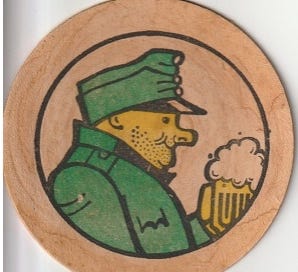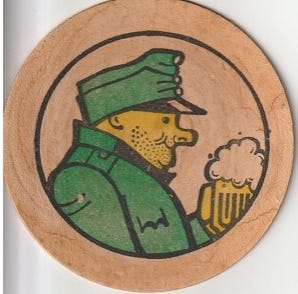Morning in working. Afternoon found the Cultural Section of the British Embassy1. The Library was closed. Charles, his girlfriend from England, and Tim were there. Went for a coffee. I’ve always found Charles’s attitude to me ambivalent2. No chance of forcing the issue here. Went with Tim to two more libraries in the Old Town. One shut. One, he said, not worth visiting. Walked back, him still feeling ill. I promised to lend him Finnegans Wake. He had only brought one book with him. Home. Wrote some postcards. Haven’t phoned home yet. Stayed in3.
An important site, because it has the only functioning photocopier young-Toby knows of in Praha. Here’s an undated note —
It is not that Communism has prevented people getting hold of Western products, it has merely made it more difficult for them to get hold of these products. Everyone buys technical goods on the black market. It is therefore not a product that they receive but a debased product. They buy from the West because the West produces better products than their own country. But these “better” products are from the worse end of the Western market. Capitalism has been operating in Czechoslovakia in a debased form, as I suspect it has in all Communist countries.
I haven’t written what happened with Charles when I first arrived at the Angličtina Expres offices, Pasáž Svetozor, the first day. Young-Toby thinks he’s gone to a city where he knows no-one. But he walks up the stairs in the small quiet arcade, to the upper level. Opposite him are large windowed, dustily empty shop units. All around him is a strange, beautiful, outdated and improvisational city. And here is Charles, who obviously knows young-Toby is coming. The last time they saw one another was in the college bar at university. Charles was usually in the college bar. And the first thing Charles says to young-Toby now is, ‘You’re going to love it here. The beer is one crown a half litre — or a quarter of a crown, if you know the right place. I know the right place.’
Later on, Charles will take young-Toby to a few of these places, to drink the best beer Toby’s ever — to this day — drunk. Approachable but deep, cultured, creamy but full of clarity. Really nothing like export Budvar. It is served by waiters in white aprons in chunky glasses with handles onto beermats printed with a picture of Good Soldier Švejk, and the slogan ‘To chce klid’ or ‘It requires calm’ or ‘Take it easy’.
Charles likes a workmen’s bar very near the offices called U Branicky Sklipek. It opens at five in the morning, so that builders can have a drink before they go on shift. Charles sometimes joins them.
Another note —
The glass in the double-glazed windows of my room has not been very well-made, is very uneven, which makes it slightly painful to look out of the window at any particular detail. The horizon is less painful to look at than the cars in the street below.
This makes me realise how I have idealised my memories. I had forgotten this distortion. In my memory, I see everything clearly. Diaries are revisionist histories. I found much of Praha life annoying, but I remember it now as blissful, overall.
And a note on Czech TV programming —
There are three channels, two Czech, one Russian. There is quite a lot of culture, as if all the channels were BBC 2, ballet. There was a prepubescent piano virtuoso on today, a little nymphet who stood up after finishing her Rachmanilov, or whatever, and posed a little Balthus pose and smiled a little Balthus smile. The Professionals, British cop show I have also seen in Italy, is on. Films: Born Free, Fantomas. The occasional game show, a documentary on jewellery, a football match. The news, shots of the Russian parliament and subcommittees, news of UFOs.
Followed by this —
Most Czechs wear slip-on shoes so that when they visit friends they can take their shoes off at the door, as is the custom, with ease. The main exception to this are the Police, who, one supposes, don’t take their shoes off when they enter somebody’s house.
The posters from before the Revolution have folds in them, those from after do not.
Communism creates a country run by cleaning ladies, but so, perhaps, does Capitalism.




